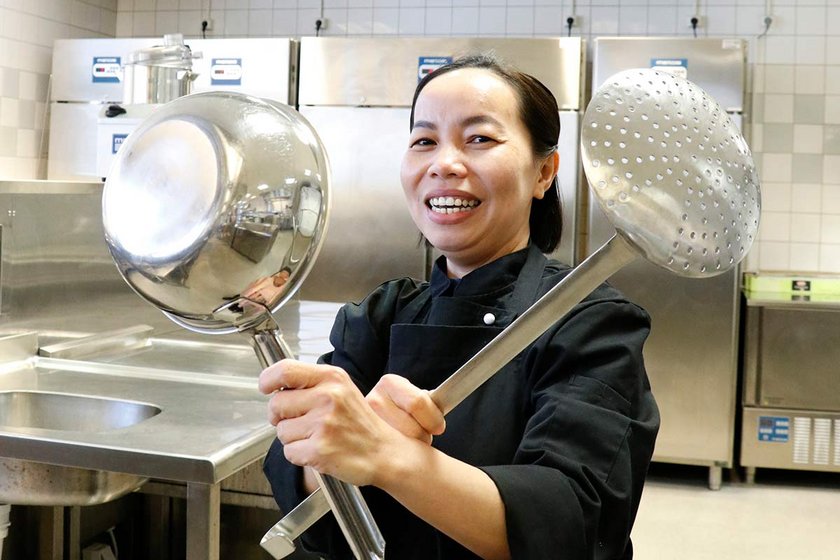Tran moved from Ho Chi Minh City to Tampere with her children in September. She is completing a professional qualification in food services and will graduate as an institutional cook in a little over a year. Like her fellow students, Tran has also come to Tampere to stay.
Finnish language and professional studies
The training started with a six-week intensive Finnish language course followed immediately by professional studies. The studies combine theoretical teaching and practical training at TAKK's teaching kitchen and workplaces. Finnish language studies continue alongside professional studies.
- The teachers are professionals in the restaurant industry, and they give help and support. I ask a lot of questions since I want to get to know Finnish culture and practices. I have not worked in the restaurant industry before, so I’m learning new things all the time and I want to learn. My self-confidence has grown through studies and practical trainings, says Tran, who worked as a language teacher in her home country.
- People in the workplaces have been very helpful and friendly. I’ve learned more Finnish along the way, especially professional words.
There have already been two practical training periods. Tran did her first training in an institutional kitchen and the second in a restaurant.
- Based on the experiences, I decided to specialize as an institutional cook. It is easier with children when you have a day job.
Learning the language has proven to be challenging for Tran. In many restaurants English is a working language, and you get by with that, but in everyday life, Finnish language skills are important. The goal is to stay permanently in Tampere and Finland.
Tampere has become home
Tampere has proven to be an excellent place to live. Life is peaceful and safe. Children have found their places in school and kindergarten. The family home was arranged with the help of TAKK's Vietnamese partner organization RAB.
- From the balcony you can admire the forest scenery, public transport runs smoothly, our house has a nice playground, and the library has become an important place for all of us, Tran lists her experiences in Finland.
The students' integration has been invested in. The students have for example been introduced to the services of the third sector, libraries, banking matters and the services of the city of Tampere.
- The international services of the city of Tampere have been great in helping the students and their families with children’s school places and other everyday arrangements, praises TAKK's director of the services sector Janne Haikansalo.
The tailor-made training programs have proven to be a good way to train new professionals for the food service industry. First group for the food service industry came from Kenya. They graduated in December 2023 and now work in restaurants all over Finland.
- Some of the Vietnamese who started in September have switched to apprenticeships. Some have moved to the capital region and elsewhere in Finland. They travel to Tampere for classroom training and do workplace training in restaurants in the area where they live," says trainer Rami Saarikoski.
The students are free to move for work.
- The most important thing is to find a job and settle into everyday life in their new home country. ___________________________________________________________________________________
Tailor-made training programs at TAKK
TAKK organizes commissioned training programs for groups from countries outside the EU. The main focus is on health and social care, restaurant, and cleaning services. The aim is to train workers for sectors where there is a shortage of workers. The customer is responsible for the cost of the training. Reliable and responsible actors are used as partners from the countries of origin.
The suitability, motivation, initial skills and English language skills of the students are mapped out by entrance exams and interviews. The interviews also ensure that the applicant has a realistic picture of what he or she is coming to. The students are supported in their integration and the training includes Finnish language teaching.
